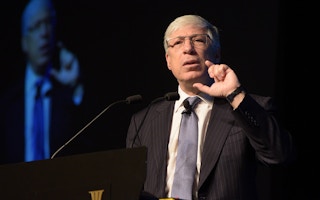Is doing good really good for business? The idea of creating shared value was a topic of much interest at the third annual Responsible Business Forum on Sustainable Development held on Tuesday.
Delivering a keynote speech, Mark Kramer, managing director of social impact consultants FSG and one of the concept’s authors, explained that shared value is about creating measurable impact on a social issue as a core part of a firm’s strategy - and it can become a competitive advantage.
Kramer, along with Harvard business guru Michael Porter, first defined the concept of “shared value” in a Harvard Business Review article in 2011.
Examples abound of firms that stand to gain from previously-overlooked forms of social impact, such as focusing on energy use or education, said Kramer.
By restructuring its packaging and logistics like truck delivery routes, for example, US retail giant Wal-Mart saved $3 billion in energy costs, according to Kramer.
In 1997, networking equipment firm Cisco discovered that its customers faced a global shortage of network administrators. It started the online training programme Cisco Networking Academy, which, by collaborating with universities, non-profits and other organisations, has trained some 5 million network administrators to date. It serves both customers and competitors alike.
“It’s about a few key issues that really matter to the success of a business, and where business has the capability to really address the problem at scale,” he said.
There are, admittedly, challenges to creating shared value, he added, including structuring a company to best accomplish it; “a certain queasiness” when thinking about social problems as business opportunities; and accurately measuring the social impact of a firm.
Ambition first
Following the keynote, representatives of three large global firms – consumer-goods firm Unilever, shipping company Maersk Line, and German firm BASF, the world’s largest chemical company – talked about their companies’ fledgling experiences in creating and measuring shared value, and the challenges they faced.
BASF recently analysed 50,000 of its product applications for their impact on health, environment, water, climate and so on, and found that 22 per cent of its products help customers improve their own sustainability profiles measurably. It is a figure they would like to raise, said BASF Asia Pacific sustainability head Rachel Fleishman.
As for products that were profitable but performed poorly in terms of impact, the firm will let them go if they cannot be improved, she added.
On its part, Maersk invests in port infrastructure to improve operating efficiency in emerging markets, and that has knock-on benefits for the community, said sustainability head Signe Bruun Jensen.
“
If you’re not responsible, you won’t be given the opportunity to operate for very much longer
Malcolm Preston, PwC, Global Sustainability Leader
She admitted that it was arguably easier for Maersk, an established, family-owned firm to to take a long-term perspective. But “sustainable, profitable growth is the same whether your firm is family-owned or answerable to shareholders”, she added.
In response to one delegate who asked how the impact of shared value creation is measured, and to what extent positive impact can be attributed to a specific firm’s actions, all three panelists acknowledged that this was a challenge.
BASF has a team studying various ways to measure value, said Fleishman.
But Kramer pointed out that when a firm’s profits go up, the chief executive does not question how much that might be due to intrinsic as opposed to external factors. “He’s just happy that profits have gone up…We need to apply that approach to shared value too”.
Unilever’s vice president for communications and sustainability for global markets David Kiu also cautioned against getting too bogged down by the details of measurement, at least in the early days.
“Measuring is important, but if you have the courage and conviction to act, that is even more important,” he said. Unilever’s Sustainable Living Plan, which includes more than 50 time-bound sustainability targets, was launched four years ago without a solid idea of how it would deliver on those promises, he shared.
“We set the ambition for the plan based on what we felt was the right thing to do,” Kiu said, adding that only then did Unilever work out how to achieve its targets.
“We need to keep track of how we’re progressing, but it’s more important to act,” he concluded.
Another delegate observed that “shared value” was just old wine in new wineskins, and that the idea that doing good makes economic sense was nothing new.
Kramer admitted that there are dimensions of shared value that are “not new”, but that senior executives and C-suite types are now “hearing it differently”, perhaps because Harvard’s Porter has significant credibility from a business perspective.
Ultimately, firms must recognise that going about business responsibly is “a license to operate”, concluded panel chair Malcolm Preston of auditors PwC, adding: “If you’re not responsible, you won’t be given the opportunity to operate for very much longer”.
The third annual Responsible Business Forum, organised by Global Initiatives, Eco-Business, in partnership with Singapore’s Nanyang Technological University and the World Wide Fund for Nature, aims to have business leaders, NGOs and policymakers come up with practical recommendations for sustainable growth.





















